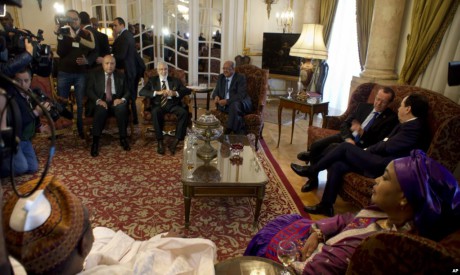
Libyan Foreign Minister Mohamed Taher Siala, top center, attends a ministerial meeting with leaders and representatives of countries neighboring Libya, Egypt, Tunisia, Sudan, Algeria, Chad, Niger and Mali, in Cairo, Egypt, Jan. 21, 2017. Also in attendance was United Nations envoy Martin Kobler, third right (Photo: AP)
Egypt attaches high priority to the Libyan crisis in view of its direct impact on Egyptian national security and because Egypt is well placed as a major regional power and one neighbouring Libya to help reach a diplomatic solution to the crisis.
Egypt’s approach to the Libyan question has been to lend its support to initiatives seeking stability, among them the Libyan Political Accord (LPA) signed in Skhirat, Morocco.
In December 2015, the efforts of the UN special envoy for Libya to broker amendments to the LPA, the holding of legislative and presidential elections in Libya before September, and the promotion of dialogue among Libya’s Arab and African neighbours in the interests of finding a solution.
Egypt’s regional initiatives in connection with the crisis have increased and intensified over the past two years as the Egyptian role has grown more distinct in both its diplomatic and military aspects.
One landmark was the Cairo Declaration of February 2017, which laid out a framework for a settlement process capable of ending the Libyan conflict and conforming to the relations among regional stakeholders.
It should be borne in mind that the internal dimensions of the Libyan conflict are intrinsically connected to the relations between Libya’s immediate neighbours, among them Egypt, Tunisia and Algeria.
The latter two countries at one point voiced objections to the track that Egypt had initiated, making it necessary for Cairo to coordinate with Tunis and Algiers in the hope of advancing a viable solution.
Egypt has used its regional influence to promote capacity-building among the Libyan political authorities, while its military influence has helped achieve significant stability in the country.
It has also been able to overcome many of the negative impacts resulting from divergences of opinion with Libya’s other neighbours, predominantly Algeria.
Egypt’s support for Libyan Field Marshal Khalifa Haftar has been controversial regionally and internationally.
For Egypt, Haftar has an important role to play in restoring stability and security in Libya and in safeguarding Egypt’s national security interests along the Egyptian-Libyan border.
Egyptian diplomacy has succeeded in convincing other regional and international parties of Haftar’s importance, and this has led the international powers to agree to the introduction of amendments into the Skhirat Accord and to accept the Egyptian view of the relationship between the Libyan military establishment and government structures.
The international powers and the UN had at first refused to include Haftar in the negotiations over the Libyan conflict.
Today, thanks to Egyptian efforts the field marshal has been accepted as a key player in them and in the current UN-brokered LPA amendment negotiations which should stimulate the process.
Egypt believes that a broader degree of consensus is needed in order to ensure the success of the amendment process, and it has been working to achieve this.
Algeria and Tunisia are coordinating their actions more closely with Egypt, now that Cairo has convinced them of the necessity of there being a united national army in Libya.
However, Egypt also believes that the scope of consensus should extend beyond Libya’s immediate neighbours in North Africa to include Saudi Arabia, the UAE, France and the US, as well as Libya’s neighbours to the south, especially Sudan, Chad and Niger.
Cairo has succeeded in reaching understandings on the Libyan question with these other parties.
In July 2017, France launched an initiative to resolve the Libyan crisis that secured Haftar’s international recognition as a key player in the political process.
The French initiative followed through on a series of Egyptian ones aimed at bringing the chairman of the Presidency Council of the Government of National Accord, Fayez Al-Sarraj, together with commander of the Libyan national army Haftar.
These efforts, which began in Cairo, culminated in the face-to-face meeting brokered by French President Emmanuel Macron between the two men on the outskirts of Paris.
Some analysts have described the Egyptian moves to seek an international framework for its mediation drive as amounting to a division of labour between Cairo and Paris.
However, Cairo’s purpose was to secure powerful international backing for Haftar on the part of a country, France, that possesses veto power in the UN Security Council.
It may seem that the scope for regional players has been narrowed now that the way has been cleared for international sponsorship of the negotiations on the Libyan crisis.
However, the conformity of view between Egypt and France has worked to sustain the politically and military influential role that Egypt has to play.
Egypt is acutely aware that developments in the Libyan conflict are critically important for Egyptian national security.
They have informed Egypt’s regional and international actions, and they have strongly influenced the course of the conflict and the manner in which the regional and international powers have handled it.
It is for these reasons that Egypt must now continue to develop its comprehensive vision of how to handle the Libyan crisis, so that it is able to contribute further at both the regional and international levels to finding a solution that is consistent with its national principles and interests.
The writer is a senior researcher at Al-Ahram Centre for Political and Strategic Studies
*This article was first published in Al-Ahram Weekly
Short link: